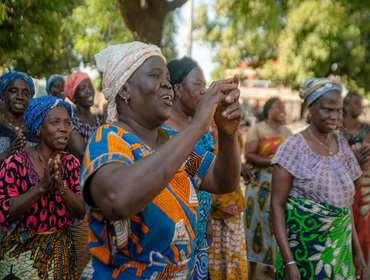From case challenge to innovation lab: Youth-led solutions for bridging the digital divide.
Stories & Blogs World Bank (Blog )Through collaboration, innovative thinking, and strategic partnerships, young people can shape the future of digital development.
Greening West African Soils
Stories & Blogs World Bank (Blog )The path to achieving a resilient agri-food sector to enhance food and nutrition security (FNS) stands at a crossroad in the West Africa region.
Sharing waters, transforming futures: CIWA's action for a climate-resilient Africa
Stories & Blogs World Bank (Blog )In Sub-Saharan Africa, where over 90% of surface water crosses national boundaries, no country can secure its water future alone.
Turning the African Continental Free Trade Area (AfCFTA) into a reality for small and mid-sized businesses in Africa.
Stories & Blogs UNDP – Africa (Blog )The African Continental Free Trade Area (AfCFTA) is poised to serve as Africa's gateway to economic transformation. AfCFTA is already proving to be a pivotal force in reshaping the economic landscape of Africa.
Digital technology – A game changer for Ghana’s agricultural input distribution.
Stories & Blogs World Bank (Blog )Delivering free or subsidized agricultural inputs to smallholder farmers in Ghana has always been a challenge—especially during emergencies, when speed is of essence
Preventing adverse effects while reforming fuel subsidies in Angola.
Stories & Blogs World Bank (Blog )Removing fuel subsidies in Angola will generate enough fiscal savings to compensate for increased production costs.
Africa’s super election year: bolting resilience against winds of democratic recession
Stories & Blogs UNDP – Africa (Blog )Africa’s new democracy narrative emerged in 2024, marking a significant chapter in the long and sometimes challenging journey toward democratic governance on the continent.
Harnessing Financial Instruments for Impact Investing
Stories & Blogs UNDP (Blog )The way we invest is changing. Increasingly, investors demand that their money not only yields financial returns but also tackles big global challenges and drives socio-economic change.
The power of networks: building connections, building a sisterhood
Stories & Blogs UNDP (Blog )Leadership is sometimes seen as an individual pursuit: a culmination of ambition, grit and perseverance.
Breaking the cycle of crisis: Women leading Peacebuilding and conflict resolution
Stories & Blogs UNDP (Blog )A group of women, dressed in vibrant attire, joyfully claps and sings outdoors. The stories of women in the Gulf of Guinea exemplify the importance of intentionally involving women in unlocking peace dividends that can strengthen societal resilience.











